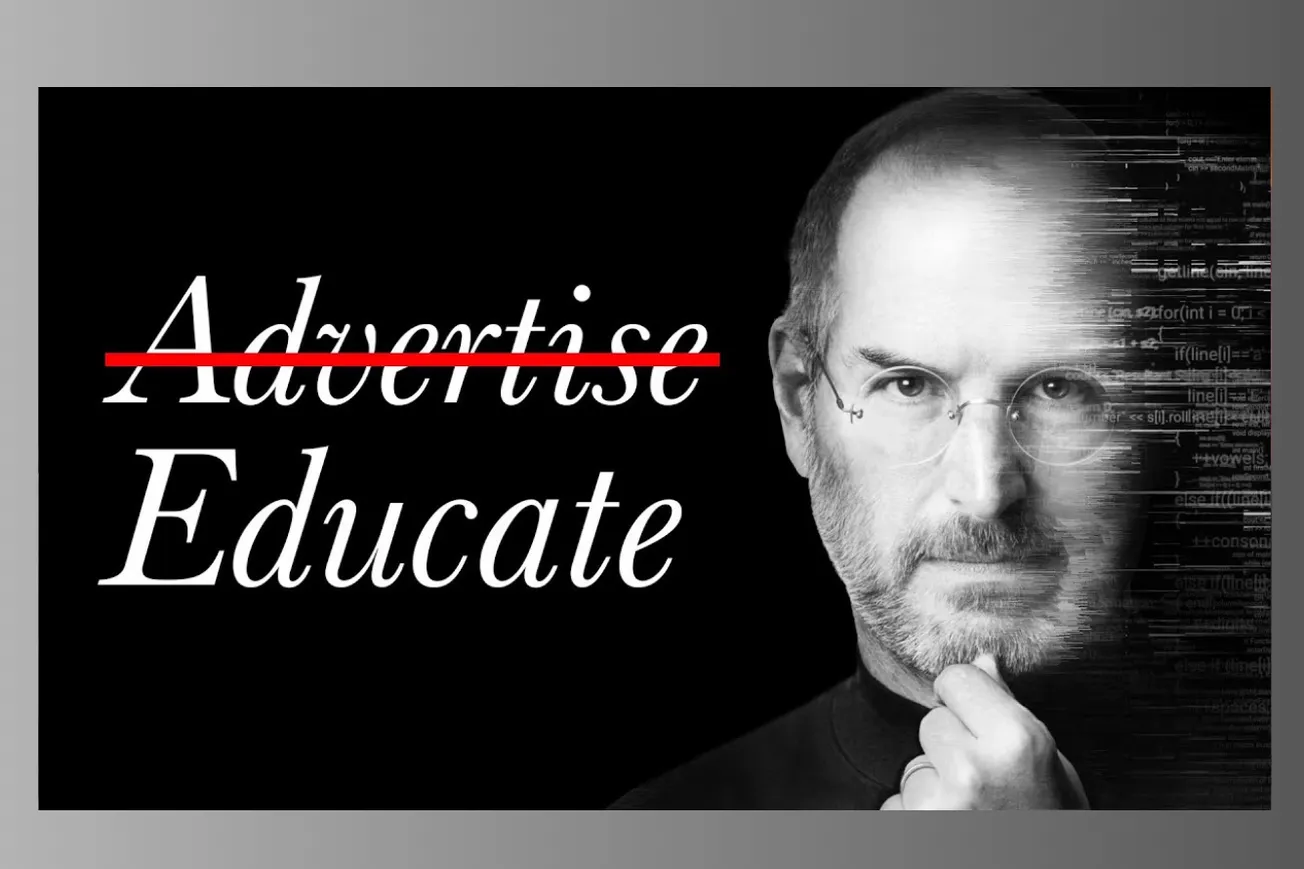Table of Contents
A deep dive into Steve Jobs's 1985 Playboy interview reveals the foundational principles that built Apple, his predictions about the computer revolution, and timeless insights on building exceptional teams and products.
Key Takeaways
- Missionaries outperform mercenaries—those who love their product and customers ultimately make more money than those chasing quick profits
- The computer revolution would dwarf the petrochemical revolution by providing "free intellectual energy" to humanity
- Great products require obsessing over details no one will see—like using beautiful wood on the back of furniture facing the wall
- Small teams of A+ players consistently outperform giant teams of B and C players across every industry
- Simplicity is the ultimate sophistication—if people need 40 hours of training to use a tool, almost no one will adopt it
- Companies lose their vision as they grow by inserting layers of management between decision-makers and creators
- The best innovations come from "troublemakers"—brilliant individual contributors who don't fit traditional corporate molds
- Personal computers would evolve from servants (following commands) to guides (anticipating needs and recognizing patterns)
- Broad life experiences create better products than narrow technical expertise alone
Timeline Overview
- 00:00–05:30 — Introduction and Context: Overview of Apple's meteoric rise to Fortune 500 status in just 5 years, Jobs's $450 million net worth at age 29, and his mission-driven approach to business
- 05:30–12:15 — Money vs. Mission Philosophy: Jobs's dismissive attitude toward wealth, drawing parallels to Jeff Bezos's missionary vs. mercenary framework and the paradox that missionaries ultimately make more money
- 12:15–18:45 — The Computer Revolution Prediction: Jobs's remarkably prescient vision that computers would become as revolutionary as the telephone or internal combustion engine, providing "free intellectual energy" to humanity
- 18:45–25:30 — Simplicity and User Experience: The telegraph vs. telephone analogy explaining why intuitive design wins over complex functionality, and Jobs's obsession with eliminating user friction
- 25:30–32:00 — Building Exceptional Teams: The importance of attracting A+ players and "troublemakers," with specific praise for Edwin Land and criticism of IBM's business-focused culture
- 32:00–38:15 — Product Excellence Philosophy: The carpenter analogy about using beautiful wood even where no one will see it, and the difference between building for market research vs. building the best possible product
- 38:15–44:30 — Company Culture and Vision: Warning about how growing companies lose their way through management layers, and Apple's identity as a refuge for brilliant individual contributors
- 44:30–50:45 — Competition and Market Strategy: Jobs's response to IBM competition, the Fortune 5 million vs. Fortune 500 strategy, and his missionary team vs. IBM's business people approach
- 50:45–57:00 — Formative Experiences: Early influences from his father's craftsmanship, growing up in Silicon Valley, and the impact of broad life experiences on product development
- 57:00–63:15 — Apple's Founding Story: Meeting Wozniak, the Homebrew Computer Club, building the Apple 1, and the transition from hobby to business with exponential growth
- 63:15–End — Future Vision and Life Philosophy: Predictions about computers becoming guides rather than servants, reflections on 10 years building Apple, and the Hindu saying about habits shaping life
The Missionary vs. Mercenary Mindset: Why Purpose Beats Profit
Steve Jobs's 1985 interview reveals a fundamental principle that would later be articulated by Jeff Bezos: the distinction between missionaries and mercenaries in business. Despite being worth $450 million at age 29, Jobs displayed remarkable indifference toward money, focusing instead on the revolutionary potential of personal computers.
"My main reaction to the money thing is that it's humorous, all the attention to it, because it's hardly the most insightful or valuable thing that has happened to me in the past 10 years," Jobs explained when asked about his wealth. This perspective aligned perfectly with what Bezos would later identify as the "great paradox"—missionaries who love their product and customers typically generate more wealth than mercenaries chasing quick financial returns.
Jobs demonstrated this principle in practice through Apple's approach to product development. Rather than conducting market research or optimizing for immediate profits, the Mac team focused on building "the greatest computer that has ever been seen." This mission-driven approach created sustainable competitive advantages that purely profit-motivated competitors couldn't match.
- Mission-driven companies attract better talent than those focused solely on financial metrics
- Long-term customer loyalty emerges from genuine product obsession rather than mercenary optimization
- Missionaries typically outperform mercenaries financially because they create more sustainable value
- The paradox of purpose: focusing on mission often generates more profit than focusing on profit directly
- Great entrepreneurs view money as a byproduct of excellence rather than the primary objective
The contrast with IBM proved particularly stark. Jobs characterized IBM as "full of business people" who "don't actually care" about products—they're "number crunchers" who "just want to make money." Meanwhile, Apple positioned itself as "a team of missionaries" who "love what we're doing" and believe computers represent "the most remarkable tools that humankind has ever come up with."
This philosophical divide extended beyond rhetoric to practical decision-making. When competitors criticized Apple for not making their computers compatible with IBM standards, Jobs responded by comparing the situation to automobile standardization in 1920: premature standardization would have prevented innovations like automatic transmission and power steering.
Predicting the Computer Revolution: Free Intellectual Energy
At age 29, Jobs demonstrated remarkable foresight about the transformative potential of personal computers. His prediction that the information revolution would "dwarf the petrochemical revolution" proved extraordinarily accurate, though it seemed fantastical to contemporaries who often mocked such grandiose claims.
"We're living in the wake of the petrochemical revolution of 100 years ago," Jobs explained. "The petrochemical revolution gave us free energy, free mechanical energy. This revolution, the information revolution, is a revolution of free energy as well, but of another kind: free intellectual energy."
The scope of his vision was breathtaking. He understood that computers would become "as common as kitchen appliances and as revolutionary in their impact as the telephone or the internal combustion engine." This wasn't marketing hyperbole—Jobs genuinely believed he was participating in a transformation comparable to the greatest technological shifts in human history.
- The computer revolution would provide "free intellectual energy" comparable to how the industrial revolution provided free mechanical energy
- Personal computers would become as ubiquitous as kitchen appliances within decades
- The transformation would rival the telephone and internal combustion engine in its societal impact
- Early adopters needed to evangelize the vision because most people couldn't yet imagine the possibilities
- Revolutionary technologies often appear toy-like or unsuitable for serious use in their early stages
Jobs's historical perspective enabled him to contextualize criticism and maintain conviction despite skepticism. When the Macintosh was dismissed as "too much of a toy, unsuitable for business use," he understood this represented a typical pattern in revolutionary technology adoption rather than a fundamental flaw.
His communication strategy involved constant historical analogies to help others understand the computer's potential. He frequently compared the current state of personal computers to the telegraph era—functional but requiring specialized knowledge—while positioning Apple's work as creating the "telephone stage" of computing that anyone could use intuitively.
The Telegraph vs. Telephone: Designing for Human Nature
One of Jobs's most brilliant insights involved understanding why simplicity beats complexity in technology adoption. His telegraph versus telephone analogy perfectly captured the principle that would define his entire career: successful tools must work with human nature rather than against it.
"Remember that the first public telegraph was inaugurated in 1844," Jobs explained. "It was an amazing breakthrough in communications. But it wouldn't have worked putting a telegraph on every desk in America because it required that people learn this whole sequence of strange incantations, Morse code, dots and dashes. It took about 40 hours to learn."
The telephone succeeded because it leveraged existing human capabilities. Everyone already knew how to talk and listen, so adoption required no training. This principle became central to Apple's design philosophy: eliminate friction between user intent and product functionality.
- If a tool requires 40 hours of training, only a tiny fraction of potential users will adopt it
- Successful technologies work with existing human capabilities rather than requiring new skills
- The best interfaces feel intuitive because they mirror familiar patterns and behaviors
- Complexity is often a choice—simplicity requires more sophisticated engineering and design thinking
- Revolutionary products succeed by making advanced capabilities accessible to ordinary people
Jobs applied this insight ruthlessly to Apple's products. When popular software like WordStar required 400-page manuals ("to write a novel, you have to read a novel"), Apple focused on creating computers that were immediately usable without extensive documentation.
The Mac team's obsession with simplicity wasn't driven by technological limitations but by deep understanding of human psychology. Jobs recognized that most people would abandon complex tools rather than invest time learning specialized skills, regardless of the tools' potential capabilities.
This philosophy extended beyond individual products to entire user experiences. Apple's "turn it on and it just works" approach eliminated the configuration, troubleshooting, and maintenance tasks that prevented widespread computer adoption.
The A+ Player Advantage: Quality vs. Quantity in Team Building
Jobs articulated one of the most important principles in entrepreneurship: the exponential difference between exceptional and average performers in knowledge work. His insight that "the dynamic range between what an average person could accomplish and what the best person could accomplish was 50 or 100 to one" challenged conventional thinking about team scaling.
"A small team of A+ players can run circles around a giant team of B and C players," Jobs observed. This wasn't merely about individual productivity—it reflected the compounding effects of excellence in collaborative environments where top performers elevate everyone around them.
Apple's approach to talent acquisition reflected this philosophy. Jobs described the company as "an Ellis Island company" built on "refugees from other companies"—brilliant individual contributors who were "troublemakers at other companies" but found productive outlets for their capabilities at Apple.
- In knowledge work, the performance gap between top and average performers can be 50-100x rather than the typical 2x found in most fields
- Small teams of exceptional people consistently outperform large teams of average performers
- Great companies often serve as refuges for talented individuals who don't fit traditional corporate structures
- "Troublemakers" frequently represent underutilized talent rather than management problems
- Building teams around A+ players requires accepting unconventional personalities and work styles
The recruitment strategy involved attracting people who "doesn't want to wait 5 or 10 years to have someone take a giant risk on him or her"—individuals seeking immediate opportunities to make significant contributions rather than following traditional career progression paths.
Jobs's admiration for Edwin Land exemplified this philosophy. He praised Land as a "brilliant troublemaker" who "saw the intersection of art and science and business and built an organization to reflect that." The fact that Land was eventually forced out of Polaroid represented, in Jobs's view, corporate failure to nurture exceptional talent.
This approach required accepting that talented people often come as "package deals" with challenging characteristics. As Jobs later observed, you must "learn to take the good with the bad" when working with truly exceptional individuals.
Craftsmanship Philosophy: Beauty Where No One Looks
Jobs's most famous articulation of his quality philosophy came through the carpenter analogy: "When you're a carpenter making a beautiful chest of drawers, you're not going to use a piece of plywood on the back, even though it faces the wall and no one will ever see it. You'll know it's there, so you're going to use a beautiful piece of wood on the back."
This principle extended far beyond aesthetic considerations to fundamental questions about integrity and purpose in work. The Mac team didn't build their computer for market research data or focus group feedback—they built it for themselves, knowing they would be the ultimate judges of its quality.
"We didn't build Mac for anybody else. We built it for ourselves," Jobs explained. "We were the group of people who were going to judge whether it was great or not. We weren't going to go out and do market research. We just wanted to build the best thing we could build."
- True craftsmanship involves maintaining standards even where quality won't be visible to customers
- Building products for yourself as the customer creates more authentic and innovative solutions than building for abstract market segments
- Quality standards must be consistent throughout the entire product, not just user-facing elements
- The best products emerge from internal conviction about excellence rather than external validation
- Integrity in unseen details often translates to excellence in visible features
This philosophy created stark contrasts with competitors. When asked about IBM's PC Junior, Jobs responded bluntly: "If they did [have pride in their product], they wouldn't have made the PC Junior. They hoped that if they built it, lots of people would buy them and they'd make lots of money. Those are different motivations."
The approach required accepting that true excellence couldn't be validated through traditional market research. As Jobs noted, "The people in the Mac group wanted to build the greatest computer that has ever been seen"—a goal that transcended conventional business metrics.
The Danger of Corporate Calcification: Vision vs. Management Layers
Perhaps Jobs's most prescient warning involved how successful companies lose their innovative edge through institutional bureaucracy. His analysis proved remarkably accurate for Apple's trajectory during his absence and countless other corporations that grew from startups to established enterprises.
"Companies, as they grow to become multi-billion dollar entities, somehow lose their vision," Jobs observed. "They insert lots of layers of middle management between the people running the company and the people doing the work. They no longer have an inherent feel or passion about the products."
The mechanism he described was devastatingly accurate: creative people who care passionately about products must "persuade five layers of management to do what they know is the right thing." This friction discourages innovation and drives away top performers, leaving companies with "mediocrity."
- Growing companies naturally develop management layers that distance decision-makers from product reality
- Bureaucratic friction discourages passionate individual contributors and drives away top talent
- Large organizations often lose the intimate product knowledge that enabled their initial success
- Institutional processes can become more important than the products they're supposed to improve
- Companies must actively fight against natural tendencies toward bureaucratic calcification
Jobs's warning proved prophetic for Apple itself. During his 12-year absence, the company exemplified exactly the problems he described—multiple product lines, unclear vision, and management layers that prevented decisive product decisions.
The solution involved maintaining startup-like cultures even at scale, preserving direct connections between leadership and product development, and continuously attracting the "troublemakers" who drive innovation rather than following established processes.
Edwin Land: The Patron Saint of Innovators
Jobs's admiration for Polaroid founder Edwin Land revealed his template for the ideal entrepreneur-inventor. Land embodied the intersection of "art and science and business" that Jobs sought to replicate at Apple, representing a model for how technical innovation could create entirely new markets.
"Dr. Edwin Land was a troublemaker. He dropped out of Harvard and founded Polaroid," Jobs explained. "Not only was he one of the great inventors of our time, but more important, he saw the intersection of art and science and business and built an organization to reflect that."
Land's eventual forced departure from Polaroid represented, in Jobs's view, corporate America's failure to appreciate true genius. "The man is a national treasure. I don't understand why people like that can't be held up as models. This is the most incredible thing to be. Not an astronaut, not a football player, but this."
- Great entrepreneurs successfully integrate technical innovation, aesthetic sensibility, and business strategy
- The best innovations emerge from individuals who transcend traditional disciplinary boundaries
- Corporations often fail to appreciate and retain the visionary founders who created their success
- True innovators should be celebrated as cultural heroes rather than marginalized as difficult personalities
- The intersection of art and science produces more revolutionary innovations than purely technical or purely aesthetic approaches
Land's influence on Jobs extended beyond business philosophy to practical product development. Both leaders shared obsessions with simplicity, user experience, and the emotional impact of technology on everyday life.
The Polaroid camera exemplified instant gratification in photography the same way personal computers would eventually provide instant access to computational power. Both innovations eliminated barriers between user intent and desired outcomes.
Jobs's reverence for Land also reflected his understanding that great innovations often come from individuals willing to challenge established industry assumptions rather than incrementally improving existing solutions.
Fortune 5 Million vs. Fortune 500: Thinking Beyond Traditional Markets
When asked how Apple could compete with IBM in business markets, Jobs revealed a fundamental strategic insight: redefining the addressable market to include opportunities that incumbents ignored or undervalued.
"Rather than just thinking of the Fortune 500, which is where IBM is strongest, I like to think of the Fortune 5 million, or the Fortune 14 million," Jobs explained. "There are 14 million small businesses in this country. I think that the vast group of people who need to be computerized includes that large number of medium and small businesses."
This market expansion required different approaches than traditional enterprise sales. Instead of viewing businesses as monolithic entities requiring complex, customizable solutions, Apple would "think of them not as businesses but as collections of people" who needed intuitive, user-friendly tools.
- Redefining addressable markets can reveal opportunities that larger competitors overlook or dismiss
- Small and medium businesses often have different needs than Fortune 500 enterprises
- Focusing on human users rather than institutional buyers can create different competitive dynamics
- Market leaders in one segment may be vulnerable in adjacent or emerging segments
- Simplicity and ease-of-use can be more valuable than enterprise features for many business users
The strategy proved remarkably successful. While IBM dominated mainframe and enterprise computing, Apple captured significant share among individual users and small businesses who valued simplicity over complexity.
Jobs's insight anticipated the broader democratization of technology that would characterize the following decades. Rather than computing remaining the exclusive domain of large corporations with dedicated IT departments, personal computers would become accessible to any individual or small business.
Broad Experience vs. Narrow Expertise: The Innovation Advantage
Jobs attributed much of his product insight to deliberately seeking diverse experiences rather than focusing narrowly on technical expertise. This philosophy contrasted sharply with the conventional wisdom that deep specialization produces better outcomes than broad exploration.
"I wasn't completely in any one world for too long," Jobs reflected on his formative years. "I got stoned for the first time. I discovered Shakespeare, Dylan Thomas, and I read Moby Dick. I went back and started taking creative writing classes. By the time I was a senior, I'd gotten permission to spend about half my time at Stanford taking classes."
This broad exposure to art, literature, philosophy, and technology created unusual perspectives that purely technical backgrounds couldn't provide. Jobs explicitly criticized Microsoft's products as "unbelievably ugly" and attributed this to Bill Gates living "a very narrow life" compared to his own "much broader set of experiences."
- Diverse life experiences often produce more innovative solutions than narrow technical expertise alone
- Cross-disciplinary knowledge enables unique insights that specialists within single domains might miss
- Creative and artistic exposure influences product design and user experience thinking
- The best innovators often combine technical capability with humanistic understanding
- Broad experience provides context for understanding how innovations fit into larger human needs and desires
The principle extended beyond individual development to team composition. Apple deliberately hired people with varied backgrounds rather than only traditional computer science graduates, believing that diverse perspectives would produce more innovative products.
This philosophy influenced everything from visual design to user interface metaphors. The Mac's desktop metaphor, for example, drew from office organization concepts that non-technical users already understood, making complex computing capabilities accessible through familiar frameworks.
The Founding Story: From Hobby to Revolution
Jobs's account of Apple's founding revealed how transformative businesses often emerge from hobbyist communities rather than formal market research or strategic planning. The transition from building computers for personal satisfaction to creating a business happened almost accidentally.
The Homebrew Computer Club provided the initial context where Wozniak developed what became the Apple I. "It was so amazing to all of us that someone had actually come up with a way to build a computer you could own yourself," Jobs recalled. "That had never been possible."
The business opportunity only became clear when "a guy who started one of the first computer stores told us that he could sell them if we could make them." Until that moment, commercial viability "had not dawned on us."
- Revolutionary businesses often emerge from hobbyist communities exploring new possibilities without commercial intent
- The transition from hobby to business frequently happens through external validation rather than internal planning
- Early adopters and enthusiasts provide crucial feedback and market validation for revolutionary products
- Personal passion and technical curiosity often drive innovation more effectively than market research
- The biggest business opportunities may not be obvious even to the people creating the enabling technologies
Apple's exponential growth demonstrated the power of timing and market readiness. From $200,000 in garage sales (1976) to $1.5 billion projected revenue (1984), the company experienced growth rates that seemed impossible to predict or plan for systematically.
Jobs's honest assessment—"Neither of us had any idea that this would go anywhere"—highlights how even successful entrepreneurs often cannot predict the ultimate scale of their ventures. The key insight involves recognizing opportunities and executing effectively rather than accurately forecasting specific outcomes.
Future Vision: From Servants to Guides
Jobs's predictions about computing's evolution proved remarkably prescient, especially his insight that computers would transition from passive tools following commands to active agents anticipating user needs and recognizing patterns.
"Thus far, we've been pretty much using our computers as good servants," Jobs explained. "We ask them to do something. But the next thing is going to be computer as guide or agent. It's going to do more in terms of anticipating what we want and doing it for us, noticing connections and patterns in what we do."
This vision anticipated everything from recommendation algorithms to predictive text to intelligent assistants that would emerge decades later. Jobs understood that the real revolution would come when computers could understand context and intent rather than simply executing explicit instructions.
- Computing would evolve from reactive command execution to proactive pattern recognition and assistance
- Future computers would anticipate user needs rather than waiting for explicit instructions
- The most valuable innovations would come from people outside the established computer industry
- Pattern recognition and contextual understanding would become more important than raw processing power
- The transition from servants to guides would represent a fundamental shift in human-computer interaction
Jobs also recognized that these breakthrough insights would likely come from "people outside the industry, people not working in Apple for 10 or 15 years" who could bring "a different way of looking at things." This humility about the sources of innovation reflected his understanding that revolutionary ideas often emerge from unexpected directions.
The challenge for established companies would involve maintaining openness to radical new approaches rather than trying to "explain away" unfamiliar concepts that didn't fit existing frameworks.
Conclusion
Steve Jobs's 1985 Playboy interview captures a 29-year-old visionary at the peak of his early success, revealing the foundational principles that would define his career and Apple's trajectory. His insights about mission-driven leadership, the power of simplicity, the importance of A+ players, and the evolution of human-computer interaction proved remarkably prescient. Most striking is his ability to place his work in historical context, understanding that he was participating in a transformation comparable to the telephone or internal combustion engine.
The interview demonstrates that great entrepreneurs combine technical capability with broad life experiences, create products for themselves rather than abstract markets, and maintain unwavering commitment to excellence even where quality isn't visible to customers. Jobs's warning about corporate calcification and his emphasis on attracting "troublemakers" revealed deep understanding of how organizations either maintain their innovative edge or gradually lose it through bureaucratic layers and risk aversion.
The wisdom in this interview transcends technology, offering timeless insights about building exceptional teams, creating revolutionary products, and maintaining the entrepreneurial spirit that transforms industries and changes the world.





